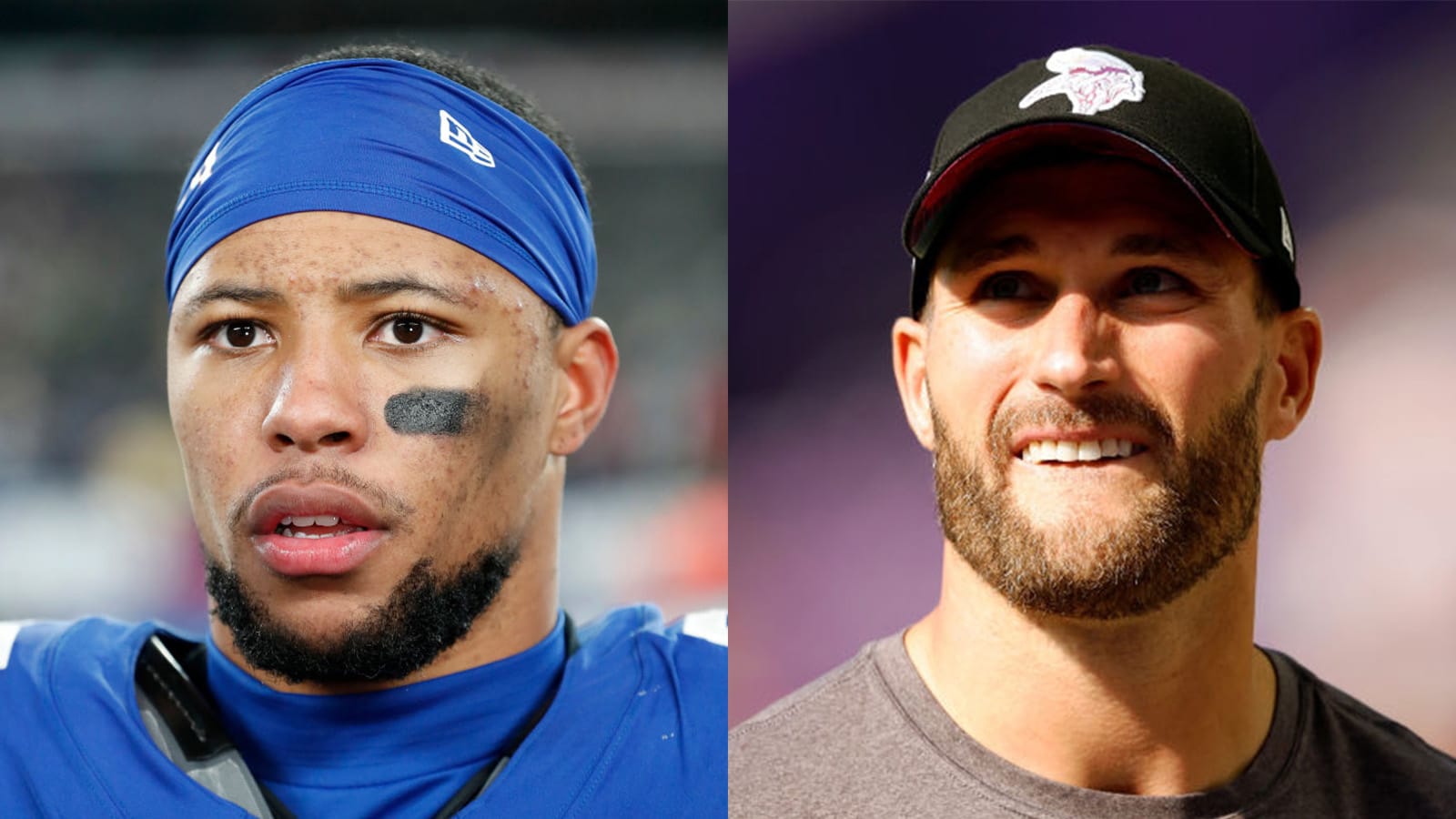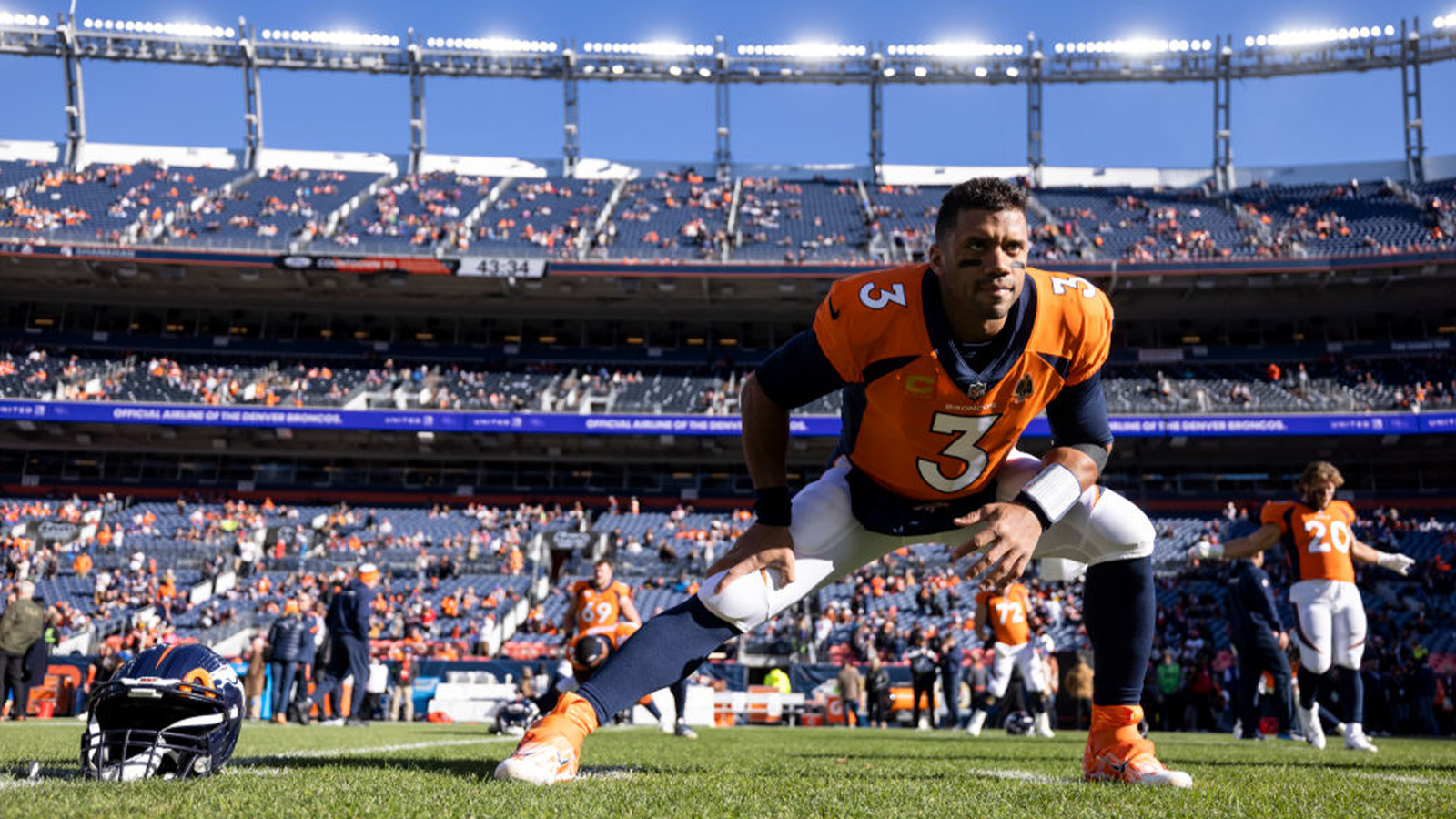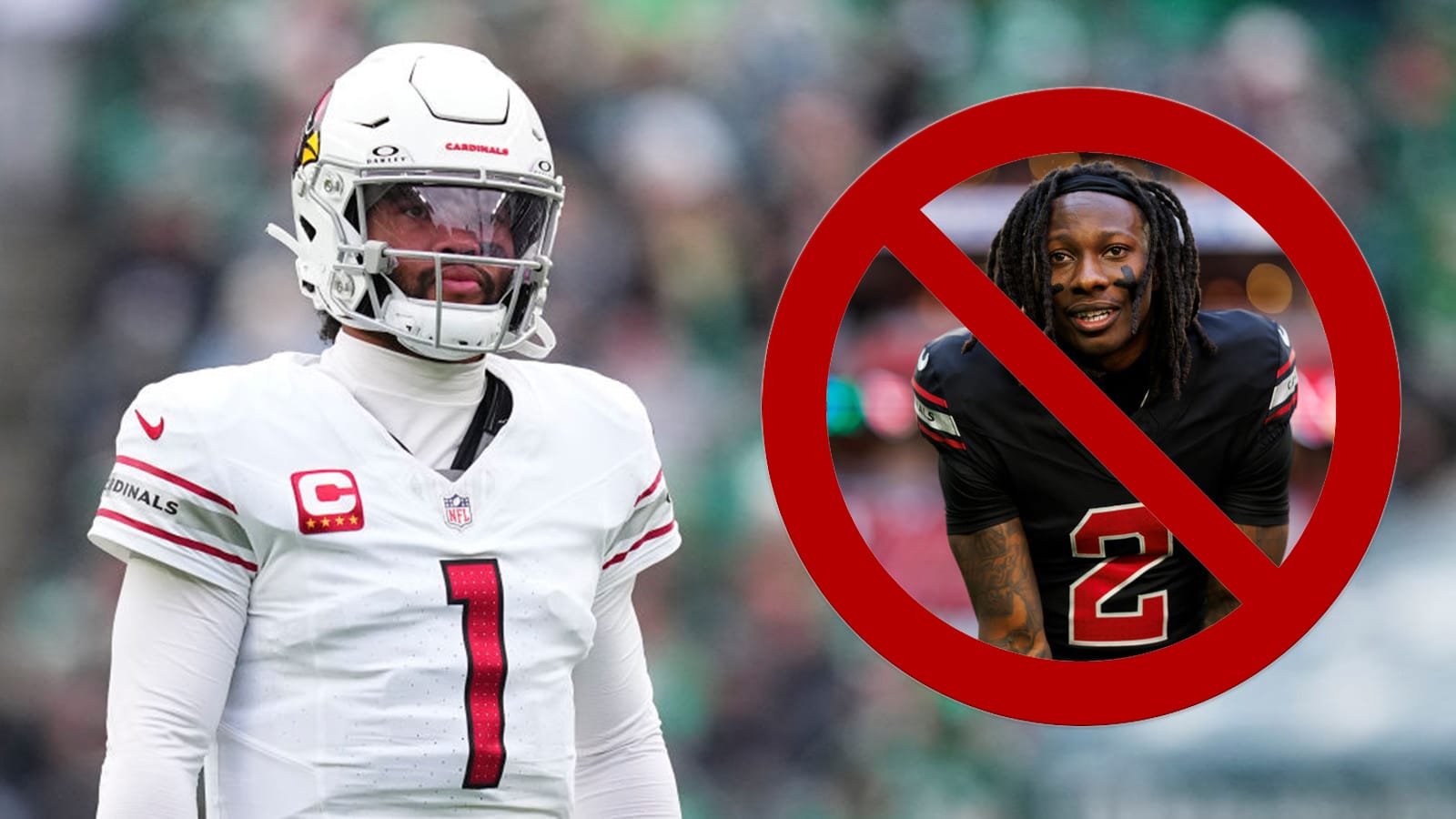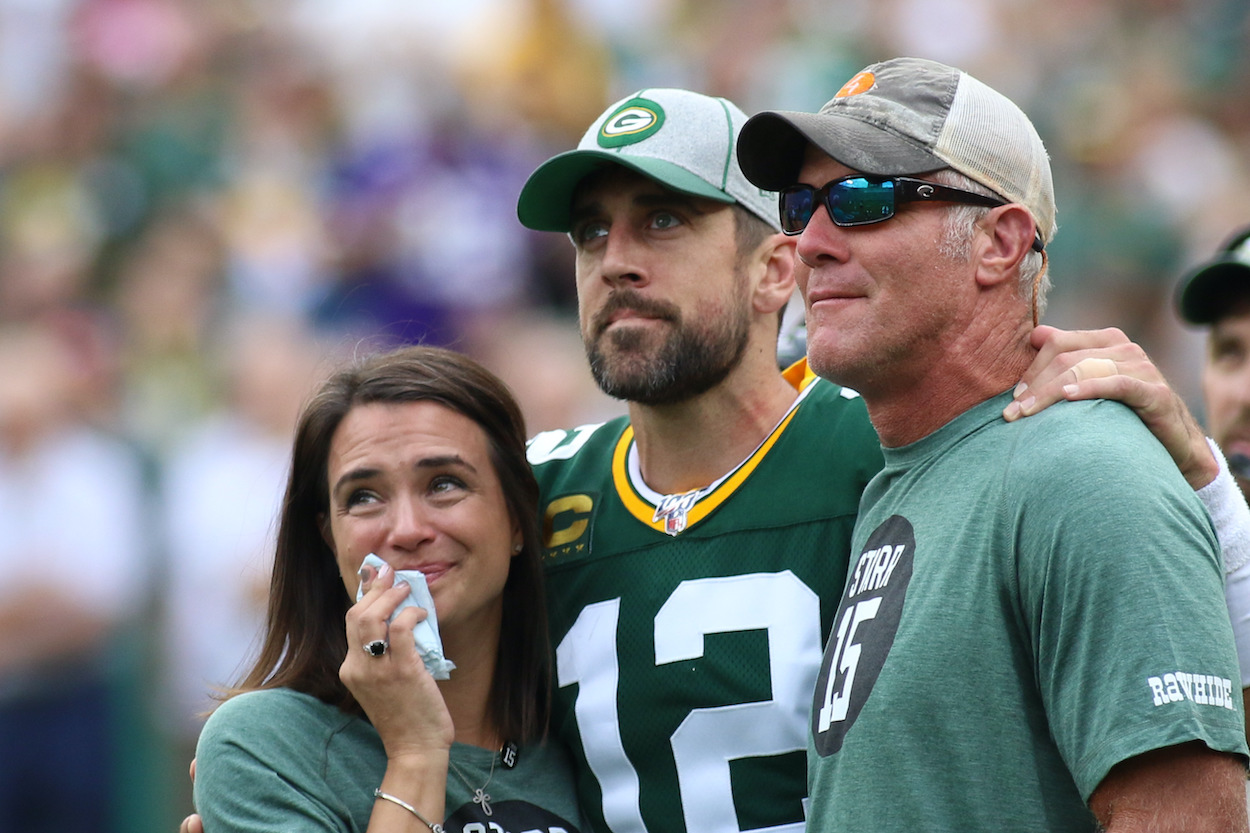
When Aaron Rodgers Joined Brett Favre on the Green Bay Packers, It was the 1st Time in His Life ‘There Was Someone Who Was Actually Better Than Me at Quarterback in the Same Room’
In the first quarter of the Green Bay Packers’ 24-22 Week 16 win over the Cleveland Browns during the 2021 NFL season, Aaron Rodgers threw a four-yard pass to a crossing Allen Lazard. The receiver caught the ball in stride, dove for the pylon, and scored the 443rd passing touchdown in Rodgers’ career, surpassing former Packers signal-caller Brett Favre’s record 442 with the franchise.
Ever since the Packers shockingly took a young quarterback out of Cal with the No. 24 pick in the 2005 NFL Draft, Rodgers and Favre have been inextricably linked. As Green Bay’s current QB was preparing to break his franchise’s TD record, he reflected on his time with Favre and how walking into a locker room with the Hall of Famer was a brand-new experience for the young passer.
Now, the Aaron Rodgers-Brett Favre connection is even stronger, as the Packers just once again traded their franchise signal-caller to the New York Jets in the 2023 offseason.
The Green Bay Packers made a controversial pick in the 2005 NFL Draft
The 2005 NFL Draft featured two potential franchise quarterbacks: Utah’s Alex Smith and Cal’s Aaron Rodgers.
The San Francisco 49ers owned the first overall pick. Instead of taking Rodgers, the local product, the team selected Smith. After that, quarterback-needy teams like the Miami Dolphins and Cleveland Browns passed on him too.
Jon Gruden (then of the Tampa Bay Buccaneers) allegedly told Rodgers he’d take him at No. 5. However, Gruden took Auburn running back Cadillac Williams when the time came. Four-and-a-half hours after the draft started, the Green Bay Packers finally selected the 6-foot-2 signal-caller.
The only problem was that the team still had 35-year-old, three-time NFL MVP QB Brett Favre, who still wanted to play football.
The two coexisted in Wisconsin for three seasons — with Favre as the starter — before the team traded the veteran to the New York Jets and gave Rodgers the reins.
While their relationship started “icy,” the two QBs eventually “developed a strong friendship,” per USA Today. The reason for the tension at first was likely due to Favre feeling threatened and, as Rodgers shared recently, him being intimidated by the first superior signal-caller he ever shared a locker room with.
Aaron Rodgers says playing with Brett Favre was a wakeup call
During the week leading up to his record-breaking TD pass, Aaron Rodgers joined the Pat McAfee Show.
A discussion about the record turned to the fact that Rodgers threw his 443 TDs with 93 interceptions while Favre threw 286 picks on his way to 442. Rodgers said one of the major reasons he’s avoided INTs over the years is that not throwing picks was “ingrained in my brain as a young player.”
He said this idea hit home especially hard when he got to the NFL. That’s when, after facing little competition in high school and good competition in JUCO and at Cal, he had a new experience when joining the Packers:
I didn’t feel like I was ever in a situation where — until I got to Green Bay. … Being around Brett was the first time I realized there was someone who was actually better than me at quarterback in the same room. … I gotta take care of the football at all costs.
Aaron Rodgers on Brett Favre
While Favre may not have been a great mentor to Rodgers right off the bat, it is interesting to hear that his mere talent and presence were enough to make Rodgers a better QB.
In fact, Rodgers became so good after starting his career backing up Favre that he is now, undoubtedly, one of the best NFL QBs of all time. The question remains, though: Is he better than Favre?
Who was the better Green Bay Packers QB: Rodgers or Favre?
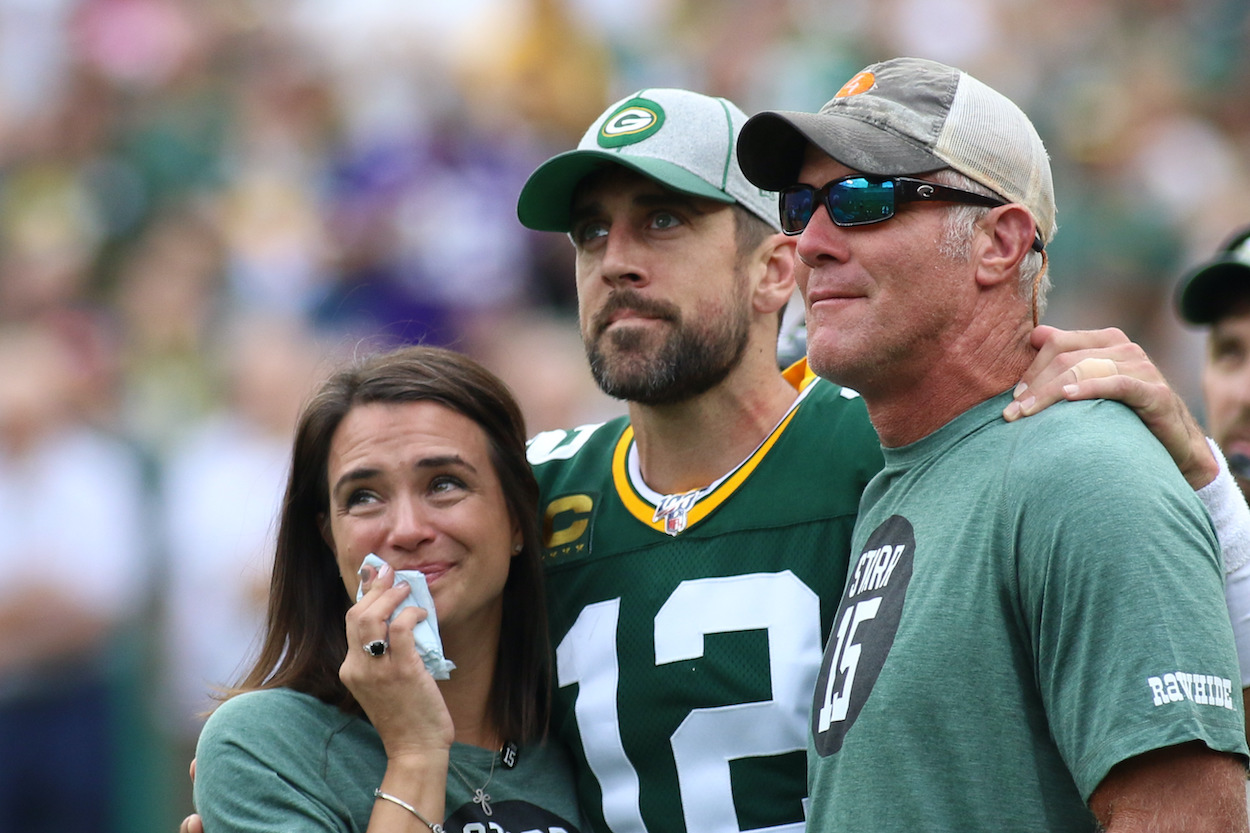
It is a question Green Bay Packers fans will likely debate until the end of time. Which legendary quarterback was better: Brett Favre or Aaron Rodgers?
The question is nearly impossible to answer because, as you can see in the table below, the two iconic signal-callers’ stats are remarkably similar.
| Brett Favre | Aaron Rodgers | |
| Seasons | 16 (’92-’07) | 18 (’05-’22) |
| Starts | 253 (consecutive) | 223 |
| Super Bowls | 1 win, 1 loss | 1 win |
| Playoff Appearances | 11 | 12 (as a starter) |
| Record as a Packers starter | 160-93-0 | 147-75-1 |
| Awards | 3 MVPs, 3 All-Pros, 9 Pro Bowls | 4 MVPs, 4 All-Pros, 10 Pro Bowls |
| Yards | 61,655 | 59,055 |
| Touchdowns | 442 | 475 |
| Interceptions | 286 | 105 |
The answer likely comes down to a matter of taste, and, truly, you can’t go wrong naming either Packer great.
If you like your QBs of the gun-slinger, Iron Man variety, the pick is Favre. He threw for 2,600 more yards in his time with the team but threw 181 more INTs. He also never missed a game as the Packers starter, which is truly amazing.
And, while Rodgers’ four MVPs came in ’11, ’14, ’20, and ’22, which is impressive from a longevity standpoint, Favre’s back-to-back-to-back MVPs in ’95, ’96, ’97 make his peak more extraordinary.
For the Rodgers lovers, the longtime consistency is everything. In one more season as a starter, the former Cal Bear has the same number of Super Bowls, more playoff appearances, and an almost identical (but slightly more impressive) personal trophy case.
As a Packers fan, whether you are a Favre or a Rodgers stan, the one thing you can agree on is that the football gods have blessed your franchise with probably the two best back-to-back franchise QBs in NFL history.
Favre and Rodgers both ended up on the Jets
In 2008, the Packers traded Brett Favre to the New York Jets to make way for Rodgers. Fifteen years later, Green Bay made an eerily similar deal to make way for Jordan Love.
A decade and a half ago, the Packers got a conditional fourth-round pick for Favre. It would jump to a third-rounder if Favre played 50% of the team’s snaps, a second-rounder if he played 70% and the team made the playoffs, and a first-round selection if he played 80% and the Jets made the Super Bowl.
In the end, Favre started all 16 games, but the team went 9-7 and missed the postseason. The Packers got a third-rounder out of that, and the QB left the following offseason for the Minnesota Vikings.
In 2023, the Jets’ trade package for Rodgers was much bigger.
New York got Rodgers, the No. 15 pick in the 2023 NFL Draft, and a fifth-round pick. In return, the Packers received the No. 13 pick in the 2023 NFL Draft, a 2023 second and sixth, and a conditional 2024 second. That future second becomes a first if Rodgers plays 65% of the team’s snaps next season, regardless of the Jets’ team success.
From a personal performance standpoint, Rodgers must make the Pro Bowl in 2023 to match Favre. That will be difficult as the AFC has a historic crop of QBs that includes Patrick Mahomes, Joe Burrow, Josh Allen, Justin Herbert, and Lamar Jackson.
From a team perspective, leading the Jets to the playoffs in 2023 will outdo Favre, and make the Rodgers trade worthwhile in the eyes of many Jets fans. However, if Rodgers accomplishes either feat, it will likely cost the Jets their 2024 first-round selection.
After that, the most intriguing thing to watch will be if Rodgers gives the Jets more than one season. The Rodgers retirement drama has been a staple of the last two offseasons, and if he does walk away in 2024, the Rodgers trade could look like a disaster in a way the Favre trade never did.
